- Home
- Jason Webster
Guerra Page 22
Guerra Read online
Page 22
Arriving in Barcelona with his wife at the end of December 1936, Orwell was immediately struck by the atmosphere in the city, which was still energized by the revolution that had taken place at the start of the war. A mass movement, mainly of anarchists, had defeated the military rising back in July and had subsequently brought about huge social changes. Most people wore workers’ overalls, the formal form of address – usted – was no longer used, and there were no private cars on the roads. ‘The working class was in the saddle,’ as Orwell later wrote in Homage to Catalonia. Most of the main buildings in the city had been taken over by trade unions or workers’ organizations, banners daubed the walls, and red and black anarchist flags flew above the roofs, revolutionary songs blaring from loudspeakers well into the night. It was all part of a stark cultural division that had developed between the Republican and Nationalist sections of the country. Whereas cities like Barcelona were all noise and promiscuity, areas under Franco’s control were noted for their austerity and silence, with public notices calling on people not to talk about politics.
‘There was much in it that I did not understand, in some ways I did not even like it,’ Orwell wrote about what he saw, ‘but I recognized it immediately as a state of affairs worth fighting for.’ What he didn’t realize, as he admitted, though, was that many members of the middle classes were either lying low for the time being or posing as members of the working class.
Orwell was assigned to the ‘Lenin Barracks’, where some one thousand men from the POUM underwent almost comical training for the front lines, being taught how to march after a fashion, but not how to take cover when under fire or how to shoot a gun – simply because there were barely any guns available. Only the sentries had rifles and Orwell was frustrated in his desire to be taught how to fire a machine-gun. Social equality was imposed on the ranks, with words like señor, ‘sir’, struck from the vocabulary. If a man disagreed with an order he could step out and argue the point with his officer. ‘Discipline did not exist.’ The ‘uniform’ was merely a half-hearted attempt by everyone to dress roughly the same, with corduroy breeches and jackets. Some wore party badges on their clothes.
Eventually Orwell was sent to the Aragon front, which was by this time fairly quiet after the rush of the first push from Barcelona towards Saragossa. The Aragonese capital remained in Nationalist hands, but the main theatre of operations was centred on Madrid. Orwell realized this and made further efforts to get transferred to the International Brigades and the heart of the action. Again he was thwarted, but this time by events on the ground.
A storm had been brewing among the various political factions within the forces lined up against Franco since the war had begun. It was merely a matter of time before it blew up. The different organizations divided roughly into two groups: those who thought the only way to defeat Franco was to have an orthodox regular army with a centralized and ordered society behind it; and those who felt revolution itself was a weapon against the fascist threat and favoured a decentralized army of loosely organized militiamen. Of the first persuasion were moderate Republicans and socialists, and the Communist Party, while on the other were most anarchists and the POUM. The communists were, at this point, strictly following Stalin’s orders to make the party and the movement as a whole more acceptable to ‘bourgeois’ countries such as Britain and France, in an attempt to form an alliance against Hitler and Mussolini. As a result, communists were among the most well-organized and anti-revolutionary groups within the Republican ranks. Given that the Soviet Union was the only foreign power sending significant amounts of military assistance to the Republic, the Spanish Communist Party, which had been very small at the outbreak of the war, was wielding ever greater influence, backed by Soviet advisers sent over from Moscow to help the war effort. And as Stalin was busy ‘purging’ dissidents back home, so the cry for ideological uniformity and orthodoxy reached Spain. The POUM and the anarchists were in their sights.
The build-up to what would later be called ‘a civil war within the civil war’ occurred while Orwell was at the front, ignorant of the tension rising back in Barcelona. It was while he was on leave in the city, noticing that the distinctions between rich and poor seemed to have resurfaced all of a sudden, and trying to get some boots made for his size-twelve feet, that things came to a head and he found himself in the middle of the ‘May Days’.
After months of tit-for-tat assassinations between communists and anarchists, the May Day processions for 1937 were cancelled in Barcelona for fear of trouble. Inflammatory articles had appeared in the anarchist and POUM newspapers, while the communist press preached ‘unity’ in the face of the common enemy while secretly plotting the downfall of the Republican prime minister, Francisco Largo Caballero. Orwell found it ironic that this most revolutionary of cities should be the only one where the twentieth anniversary of the Russian revolution was not being celebrated. Two days later, however, he discovered why. On 3 May a delegation from the local Catalan government tried to take over the telephone-exchange building in the centre of the city. Although it was theoretically controlled by both socialist and anarchist union members, the anarchists had the upper hand and it was feared they were listening in to official phone calls. Arriving with a group of armed policemen, the delegation was immediately forced back by anarchists firing from the upper floors. After several hours of negotiations it seemed the stand-off had been resolved, but the event triggered the resentment between the various parties that had been growing over the previous months.
By the next day armed men had taken over the streets and set up barricades, much as they had done at the start of the war. Barcelona was at war against itself. The anarchist union, the CNT, controlled most of the suburbs, but the centre was divided down the Ramblas, the main avenue at the heart of the city running from the Plaza de Cataluña to the sea. The communists and socialists were on the left-hand side, the anarchists on the right. Gunmen took to the rooftops and fired at any vehicle that moved. The situation was complicated by the fact that the anarchists themselves were now deeply divided. Some had taken the ideologically paradoxical step of joining the Republican government based in Valencia, while others, such as a group calling itself the ‘Friends of Durruti’, wanted a return to the glorious days of the previous July, when the military coup had been foiled in the city and a workers’ revolution had spontaneously broken out. As far as they were concerned, the forces of the counterrevolution were on the march and had to be stopped.
Whereas in July the hard-line anarchists had been backed from all sides against the military rebels, this time their only potential allies were the POUM. Never great friends in the past, the two parties now found themselves pitched together against the local Catalan government and the communists, who were supported by crack teams from the Assault Guards.
Franco later liked to take the credit for what happened in Barcelona that May, saying he had a dozen agents working for him in the city at the time. It isn’t clear how great a role they played in creating the conflict, but the various Republican factions were close to blows anyway. The communists saw this as their opportunity to eclipse once and for all the POUM, the anarchists and Prime Minister Largo Caballero – a man they had originally courted but now wanted removed.
As the fighting in Barcelona flared up, Orwell dashed up and down the Ramblas trying not to get shot as he moved between the Hotel Continental, where his wife was staying, and the Hotel Falcon down the road, which had become the POUM headquarters. Once he had installed himself with his colleagues, he was placed on guard duty on the rooftop; periods of stalemate in the fighting were interspersed with sporadic shooting. Anarchist militiamen were said to be on their way from the front to storm the city, but eventually they were persuaded to hold back by the anarchist ministers in the Valencia government. The factions held their positions and the city remained divided. Tensions increased when a couple of days later the bodies of murdered anti-communists were discovered, including the brother of Francisco Ascaso, Du
rruti’s best friend. Later the anarchists assassinated the socialist union leader Antonio Sesé, presumably in retaliation.
On the whole, however, as Orwell remarked, this ‘mini civil war’ was a static affair. ‘So far as I could see, and from all I heard, the fighting was defensive on both sides. People simply remained in their buildings or behind their barricades and blazed away at the people opposite.’ It was a time of ‘violent inertia’, and Orwell and others would take turns on guard duty before heading down to the Hotel Continental for meals. The place had become something of a refuge for people seeking respite from the troubles outside in the city, and was filled with foreign journalists, political activists and several communist agents, including a ‘fat, sinister-looking Russian’ who walked around with a revolver and a bomb attached to his waistband, whom they nicknamed Charlie Chan. As the days passed and still the stand-off continued, Orwell was fascinated to see how this man would corner all the foreign refugees in the hotel and explain how the conflict was all down to an anarchist plot. ‘I watched him with some interest,’ he wrote, ‘for it was the first time I had seen a person whose profession was telling lies – unless one counts journalists.’ Barcelona, and Republican Spain, was soon to be overrun by men like Charlie Chan.
As the conflict continued, Orwell began to get bored, having to spend hours on rooftop guard duty, reading Penguin paperbacks to while away the time. Very little actually seemed to be happening. A short-lived truce came and went, resulting in more gunfire. All the while he and his colleagues were in danger of being shot at by policemen on the roof of the next building. Eventually a peace agreement was reached between the various factions. The government in Valencia sent up more Assault Guards to take control of the city, and the fighting came to a halt.
According to official figures, a total of four hundred people had been killed in the fighting and a thousand wounded. Later claims would put the number killed as high as nine hundred. The red and black anarchist flag was taken down from the telephone-exchange building, where the conflict had begun, and replaced with the Catalan flag. ‘That meant that the workers were definitely beaten.’ Orwell – and most people in Barcelona, you imagine – was greatly relieved, if only because it was now safe to go out into the streets and buy something to eat – one of the greatest hardships of the previous days had been the shortage of food.
With the re-establishment of order came a handful of arrests – a wounded friend from the front had to spend eight days in a cell so crowded there was no room to lie down. And the atmosphere in the city underwent a sinister change. ‘You had all the while the hateful feeling that someone hitherto your friend might be denouncing you to the secret police.’ The campaign against the anarchists, and particularly against the POUM, had begun. The POUM newspaper was subjected to censorship so heavy it appeared with almost its entire front page blanked out. Meanwhile the communist press appeared as normal, denouncing the POUM in a cartoon as a party of ‘fascists’. These independent, anti-Moscow Marxists, to whose militia Orwell was still attached, were being turned into the scapegoats for all that had happened. ‘No one who was in Barcelona then, or for months later, will forget the horrible atmosphere produced by fear, suspicion, hatred, censored newspapers, crammed jails, enormous food queues and prowling gangs of armed men.’
Ironically, Orwell was approached at this time to see if he wanted to join the International Brigades. It would have meant being taken to the Madrid front, where he wanted to be, but this time he refused, claiming that after what had just happened he couldn’t join any communist-controlled unit. ‘Sooner or later it might mean being used against the Spanish working class.’
He left again for the positions of his POUM comrades on the Aragon front, but not before noticing how much better the Assault Guards were armed, with their new rifles sent from the Soviet Union, than the men actually fighting the enemy on the front lines. ‘I suspect it is the same in all wars – always the same contrast between the sleek police in the rear and ragged soldiers in the line.’ It was a sign of how much more importance was being placed on the political struggles back home than on fighting Franco. Not reading the signals, Orwell was still blind to how much danger he himself was in.
Not long after he arrived for his second stint at the front, he was shot in the neck, an experience which he described as being ‘at the centre of an explosion’. Realizing where he’d been hit, he assumed at first he was dying. Miraculously, though, the bullet missed the carotid artery and merely damaged his vocal cords. For some time he couldn’t speak, and a doctor told him he would never recover his voice, although he eventually did. There now followed several weeks of recuperation, being carted around from the front to various hospitals, eventually ending up on the coast at Tarragona. Around him great political changes were taking place as a result of the ‘May Days’ in Barcelona, of which he was totally unaware. A couple of weeks after the fighting, the communists achieved their aim of bringing down Largo Caballero’s government. They now moved in on the POUM.
Seriously wounded as he was, Orwell realized his fighting days were over and decided to return to England. He needed his discharge papers signing, however, a process which involved travelling back almost to the front line to get the right person’s signature. This done, he returned to Barcelona.
The first sign that anything was wrong came when he walked back into the Hotel Continental and his wife immediately ran up, threw her arms around him and hissed into his ear, ‘Get out!’ Orwell didn’t react straight away and she had to repeat what she’d said. A passing Frenchman and a POUM member of staff confirmed the situation: he was in danger. As she led him from the hotel, his wife explained that while he’d been away the POUM had been declared illegal and its buildings seized. Almost everyone associated with it had been arrested, and there was a rumour circulating that the party leader, Andrés Nin, had been shot. Even then it took Orwell time to realize the seriousness of the situation. ‘It all seemed too meaningless.’ But they had to get out of Spain as quickly as possible. It was only a matter of time before they came for him. The police had already raided their room at the hotel, and presumably the only reason his wife hadn’t been taken in already was so that she could be used as a decoy. Although they didn’t know it at the time, a warrant had been issued for the arrest of both of them by the newly created Tribunal for Espionage and High Treason, for being ‘confirmed Trotskyites’.
Leaving the country was a complicated business, however, and required obtaining permission from three separate bodies, including the chief of police and the French Consulate. While their papers were being processed through the British Consulate, Orwell tore up his POUM militiaman’s card and a photograph showing soldiers with the POUM flag in the background. He now had to pretend to be a well-to-do foreign tourist during the day, sleeping rough on the outskirts of the city at night for fear of being picked up. It took a couple of days to get their papers in order, a time during which Orwell could have been arrested at any instant. Nonetheless, he made an attempt to secure the release of his commanding officer, who had been detained along with other members of the POUM. Despite risking arrest himself by walking boldly into the War Department to demand a document he thought might save the man’s life, the attempt failed.
Two days later, the Orwells and a couple of friends – John McNair and Stafford Cottmann – were escaping on a train. Luckily their names had not yet reached the border guards, and after a thorough search they were allowed over into France. As soon as they arrived they read a newspaper report announcing that McNair had been arrested for spying.
Had Orwell been caught – and Spanish inefficiency or sheer luck must have accounted for him getting away – he would almost certainly have been killed, or died while being tortured to make him ‘confess’ his treason. The POUM was accused of being in the pay of the fascists, a ‘fifth column’ organization. But if the communists had hoped for a rerun of the Moscow show trials, they were disappointed: Andrés Nin, the POUM leader, died refusing
to incriminate himself. The communist education minister, Jesús Hernández, gave an account of his fate:
[Nin] was resisting until he fainted. His inquisitors were getting impatient. They decided to abandon the ‘dry’ method. Then the blood flowed, the skin peeled off, muscles torn, physical suffering pushed to the limits of human endurance. Nin resisted the cruel pain of the most refined tortures. In a few days his face was a shapeless mass of flesh.
Realizing they weren’t getting anywhere, the communists devised an absurd scheme to get rid of him: Germans from the International Brigades were made to dress up as Gestapo commandos and kidnap Nin, being careful to leave ‘clues’ such as German banknotes at the scene. He was finally murdered and his body disposed of.
The repression of the POUM was merely an early step in the communists’ brutal drive to power. Shortly afterwards they took over the workings of a newly created secret police, the SIM, which tortured and murdered suspected political heretics, including troops from the front, purely for not being supportive enough of the party. Early torture techniques involved beatings with rubber piping, mock executions and splinters placed under prisoners’ nails. Visiting agents from the Soviet NKVD soon introduced them to more sophisticated methods, showing them how to build special cells with sharp bits of brick sticking up from the floor so that the naked suspect was unable to sit or lie down and was kept in constant pain. They also used powerful lights and strange noises to disorientate, when not resorting to the electric chair for quicker results.
Orwell managed to make it back to Britain after travelling up through France and crossing the Channel. It was a world away from the fighting south of the Pyrenees. ‘The men in bowler hats, the pigeons in Trafalgar Square, the red buses, the blue policemen – all sleeping the deep, deep sleep of England …’ In the words of his biographer, D. J. Taylor, Spain was ‘the defining experience of Orwell’s life’. Much of his later work was built on what had happened to him and what he had seen there. ‘It was in Spain that, for the first time in his life, Orwell saw newspaper articles that bore no relation to the known facts, read accounts of battles where no fighting had taken place, saw troops who had fought valiantly denounced as cowards and traitors.’ A world was coming into being where propaganda and ‘double speak’ – later it would be called ‘spin’ – played a dominant role, and the man who would open our eyes to its insidiousness and danger was there at its birth, and was very nearly its victim. Years before Snowball was banished from Animal Farm, or Winston Smith was persecuted at the hands of Big Brother in Oceania for ‘thoughtcrime’, Orwell himself had come close to suffering a similar fate in Barcelona.

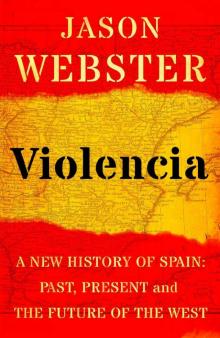 Violencia
Violencia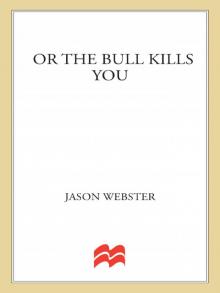 Or the Bull Kills You
Or the Bull Kills You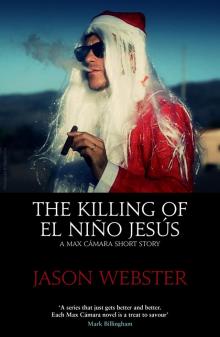 The Killing of El Niño Jesús
The Killing of El Niño Jesús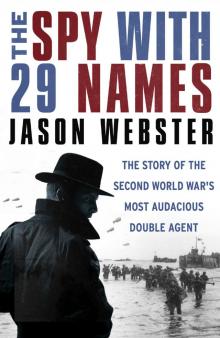 The Spy with 29 Names
The Spy with 29 Names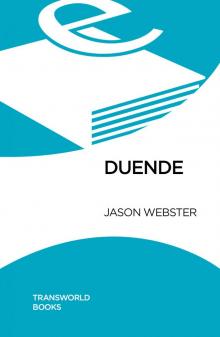 Duende
Duende Guerra
Guerra Sacred Sierra
Sacred Sierra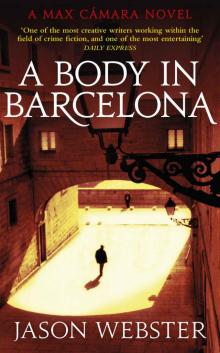 A Body in Barcelona: Max Cámara 5
A Body in Barcelona: Max Cámara 5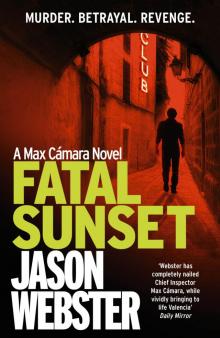 Fatal Sunset
Fatal Sunset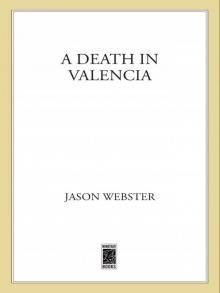 A Death in Valencia
A Death in Valencia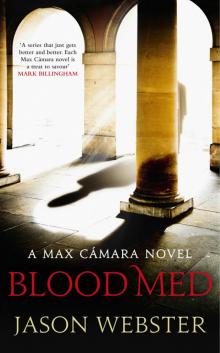 Blood Med
Blood Med Andalus
Andalus